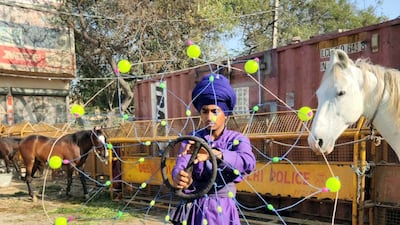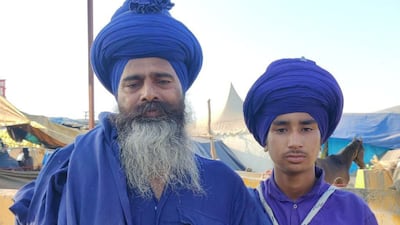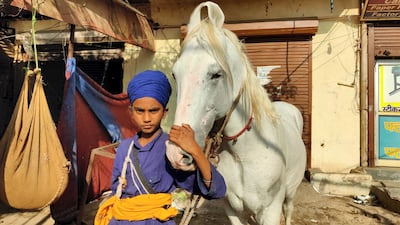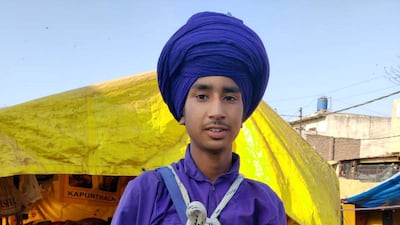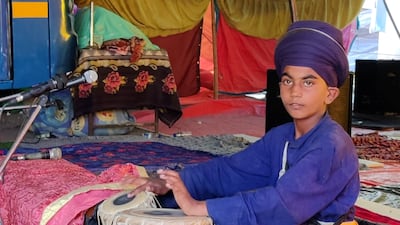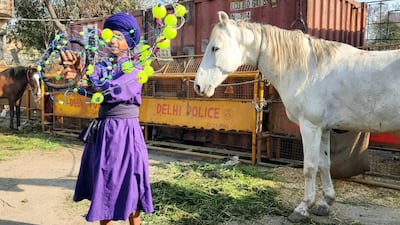Son Singh, 15, wakes up on the outskirts of India's capital at 4am every day and bathes before praying for two hours at a makeshift gurdwara, or Sikh temple. After meeting his guru, he helps out in the community kitchen before feeding and grooming his horse, Dillitod. Then comes training in swordsmanship and other martial skills.
The teenager is one of the youngest members of the Nihang, an ancient Sikh order of pious warriors, who are guarding the tens of thousands of farmers who have been camped outside New Delhi since November to protest against the government's new agricultural laws.
"It is now more essential than ever that we practise fighting because these farmers need our support in their fight against the black laws," Son Singh told The National in the tent city on the Singhu border near New Delhi.
Born in a Hindu family from Haryana state, which borders New Delhi on three sides, the teenager said he was inspired to join the order three years ago after being struck by the charisma and lifestyle of a Nihang guru.
He left his parents and two younger siblings, a brother and a sister, to join the dera, or camp, in the neighbouring state of Punjab and follow the same path.
Son Singh, Nihang cadet
"I have learnt fighting with a sword, horse riding and important lessons on Sikh religion. I have learnt to follow the path of truth and protect people as a Nihang, which I could not have learnt in a modern school," he said.
The order was founded in the late 17th century by Guru Gobind Singh to defend the religion.
It later recast itself as an army of the Sikh empire that existed from 1799 to 1849, covering the modern Punjab provinces in India and Pakistan, as well as parts of Kashmir. Its capital was in Lahore, the present capital of Pakistan's Punjab province.
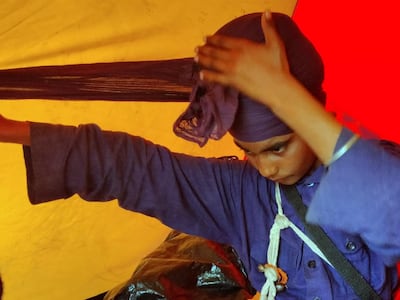
The order was reduced to performing ceremonial roles when the British dissolved the Sikh empire in the mid-19th century, but a sizeable number of adherents continue its martial and religious traditions.
Anyone of any age and religion can join, but they have to adhere to the strict lifestyle and tenets of the order. These include wearing long, electric-blue robes and turbans reinforced with steel rings, training in horsemanship and carrying weapons such as swords, spears and daggers at all times.
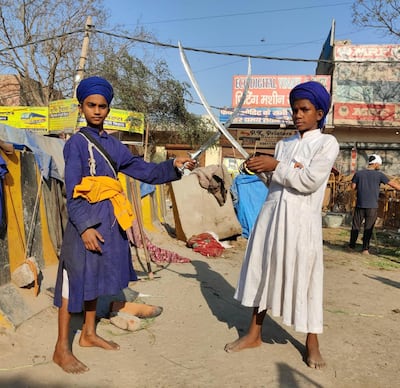
The Nihang use only iron utensils and cutlery to cook and eat their meals. They drink an infusion of ground almonds, poppy seeds and rose petals that is sometimes laced with cannabis. Horses hold an important place in their lives and are called "jaan bhai" or "life brother".
They also distance themselves from worldly matters, including domestic life. While some marry, they live away from their homes in camps spread across the country, from where they travel on horseback to Sikh temples and community meetings every three days.
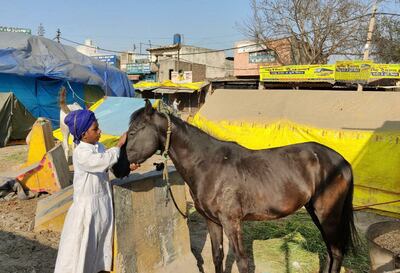
The farmers' protest, however, is the first time in decades that hundreds of the Nihang have stayed put in one place for 100 days, said Raja Raj Singh, a top commander.
"We are the armour of the protesting farmers," Mr Raj Singh, 46, told The National.
"This is the first time when Nihangs have come out of Punjab to join a movement because this is a fight for justice. Farmers are here for their rights and if anyone tries to harm them, they will have to face us first."
The farmers, mostly from Haryana and Punjab, are in a tense stand-off with the government over new laws that deregulate India’s vast agriculture sector.
They have been camped along a five-kilometre stretch of road near the Delhi-Haryana border since November 26, when riot police stopped their march into the capital.
The area resembles a war zone after authorities blocked off the farmers' encampment with concrete barriers, iron spikes and barbed wire and posted thousands of armed police there.
Equipped with swords, spears, axes and walkie-talkies, the Nihang have taken it upon themselves to police the tent city and ensure the safety and security of the predominantly Sikh protesters, recalling their history of defending the Sikh religion with ferocity and piety.
But this has drawn accusations of undermining the rule of law, particularly after clashes between farmers and police in New Delhi on January 26, when some of the Nihang attacked police officers and stormed into the historic Red Fort on horseback.
Talwinder Singh, 50, who joined the community 25 years ago, said the Nihangs were fulfilling their religious duties and their weapons are only intended to protect the oppressed.
"Some people are scared of us or our weapons, but we fight for righteousness. We are not here to harm anybody but to protect the farmers who are being oppressed by the government. We are defending them," he said.
